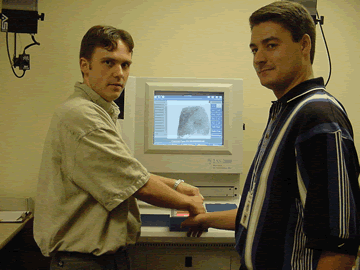


 |
 |
 |
| The
Division of Criminal Investigation was created in 1921 to provide investigative
support and expertise to law enforcement agencies across the state. The
Division is comprised of four functional areas: Criminalistics Laboratory,
Field Operations, Administration, and Gaming Enforcement. One hundred and twenty-three sworn officers and 102 civilian employees handle the ever-increasing workload of the Division of Criminal Investigation. |

 Darwin Chapman, DCI Director |
|
| Administration |
|
| The Administration Area of the Division of Criminal Investigation includes the Records and Identification Unit, as well as many of the functions associated with running a division, including clerical, inventory, budgeting, etc. | |
| Records
and Identification Records and Identification Unit is the central repository for all Iowa criminal history records. This information is used in a variety of critical areas, including sentencing determinations, parole or probation recommendations, issuance of weapon permits, and decisions by prosecutors. In 1996, Iowa criminal history information became available to members of the public for a nominal fee. |
Criminal
History Requests
FY 97 - FY 02

| Automated
Fingerprint Identification System (AFIS) |
|
| As of June
30, 2002, the Automated Fingerprint Identification System (AFIS) included
over 444,734 ten print cards and nearly 12,180 latent prints. AFIS is available
to all criminal justice agencies throughout Iowa for use in criminal investigation.
During FY 02, 18,798 ten print "hits", and 338 latent print "hits"
were made via AFIS. A hit occurs when a print lifted from a crime scene
matches one in the Automated Fingerprint Identification System. The main AFIS computer is located in the Division of Criminal Investigation Headquarters in Des Moines. Additional AFIS latent terminals are located in the Cedar Rapids, Davenport and Des Moines Police Departments, thereby permitting easy access by Iowa law enforcement officials. Images are stored on tape rather than optical platters, making access faster and identification more accurate. Livescan sites were introduced in FY99. Livescan is a method of sending required arrest fingerprint cards electronically from a police agency to the central site at DCI. Agencies are required to take 2 sets of prints and mail two (one DCI and one FBI). With Livescan, they roll one set and print as many as needed. The addition of Livescan terminals at various locations around the state has help expedite the process of creating and updating criminal history information maintained by the Division. |
 Livescan computers are located throughout Iowa. |
| Criminalistics Laboratory | ||
 |
The
Criminalistics Laboratory, with 41 highly skilled criminalists, analyzes
evidence obtained from crime scenes by law enforcement agencies. The criminalists,
specializing in a wide range of areas - from photography to latent prints,
and DNA to computer crime, and the examination of evidence from agencies
throughout Iowa. Criminalists are on call 24 hours a day, seven days a week to respond to requests statewide from law enforcement agencies needing assistance. Providing full scientific services to the criminal justice community, criminalists handle all aspects of crime scene processing - from the initial collection of evidence at the scene to testimony in court. |
|
| The Criminalistics
Laboratory is divided into fourteen areas: Computer Crime, DNA, Document
Examination, Drugs, Evidence Processing, Firearms/Tool Mark Identification,
Latent Print, Photo, Trace Evidence, Toxicology, Breath/Urine/Alcohol, Arson,
and Crime Scene Investigation. The Criminalistics Laboratory analyzes human biological fluids for OWI enforcement, and most street drugs seized by law enforcement agencies in Iowa. The number of street drugs analyzed by the DCI Laboratory in Fiscal Year 2002 was 6,765. |
 |
|
DCI
Crime Laboratory |
Overall, the Criminalistics Lab processed over 18,600 cases. The identification of controlled substances and analysis of human biological fluids for OWI investigations represent the largest volume in caseload duties for the laboratory. |
| DNA DNA analysis has provided the DCI Laboratory with a significant tool for the efficient resolution of cases. Personnel in the Laboratory began work on DNA cases in 1995 using DQ alpha, polymarker, and D1S80 systems. Short Tandem Repeat (STR) analysis has also been added to the laboratory's analysis system. Creation of the DNA database of criminal offenders and parolees has been completed and is ever expanding. Currently there are 3,059 profiles that have been completed. Under current legislation, the database is expected to increase by approximately 800 samples per year. |
Street
Drugs Analyzed |
| Field
Operations |
| The Field
Operations Area of the Division of Criminal Investigation (DCI) includes
the General Criminal Unit, and the Special Operations Unit, consisting of
the Missing Persons Information Clearinghouse and the Sex Offender Registry. |
General
Criminal Investigations |
The 36 special agents assigned to the General Criminal area provide investigative expertise to local, county, and state agencies requesting assistance in major criminal cases. They provide expertise in the areas of crime scene search, collection and preservation of evidence, investigation, and with suspect and witness interviews. The DCI works with all state, federal, county and city law enforcement agencies in the state to resolve crimes. Agents of the General Criminal Unit provide these services from fourteen field offices situated within four geographical zones in the state. Two agents in the Division of Criminal Investigation are specifically trained to provide polygraph services to the Department and the Iowa law enforcement community. |
 |
|
The Clearinghouse
publishes a monthly bulletin which containing names, photographs, descriptions
and circumstances surrounding the disappearance of Iowa individuals. The
bulletin is distributed to Iowa law enforcement agencies, the National
Center for Missing and Exploited Children, all state clearinghouses, and
other interested individuals and/or agencies requesting a copy of the
bulletin. Weekly public service announcements are also generated to provide
updated information to the Missing Person Bulletin. |
| Sex Offender Registry |
| Chapter 692A of the Iowa Code established the Iowa Sex Offender Registry in July of 1995. The Iowa Sex Offender Registry, maintained by the Division of Criminal Investigation, lists the name and current address of the offender, who has been convicted or adjudicated of a criminal offense against a minor, sexual exploitation, or a sexually violent crime or who was on probation, parole, or work release status, or who was incarcerated on or after July 1, 1995. Registration does include individuals that have received a deferred sentence or deferred judgments and can include convictions from other jurisdictions such as other states and/or federal convictions. The Sex Offender Registry is updated continuously based on information provided by state and local government agencies and the registrants themselves. As of July 1, 2002, 4,758 individuals were listed on the Iowa Sex Offender Registry. |
| Racing
& Gaming |
 |
| The
Gaming Unit within the Division of Criminal Investigation is in charge of
both criminal investigations and regulatory enforcement of the laws and
rules dealing with gambling in Iowa. With 40 Gaming Enforcement Officers
and 27 Special Agents, this unit provides enforcement and investigative
services for the Iowa Lottery, the nine riverboats, and three racetracks
in Iowa. |
 |
Pari-Mutual/Slot Tracks *
The Dubuque Greyhound Park & Casino - Dubuque |
Riverboat Casino's in Iowa *
The Miss Marquette - Marquette |
 |
|
|

Created 10/1/02 BAL